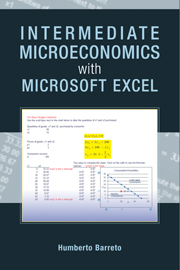Book contents
- Frontmatter
- Contents
- Preface
- User Guide
- Introduction
- PART I THE THEORY OF CONSUMER BEHAVIOR
- PART II THE THEORY OF THE FIRM
- 2.1 Production Function
- 2.2 Input Cost Minimization
- 2.3 Output Profit Maximization
- 2.4 Input Profit Maximization
- 2.5 Consistency in the Theory of the Firm
- 2.6 Monopoly
- 2.7 Game Theory
- PART III THE MARKET SYSTEM
- Conclusion
- Index
2.2 - Input Cost Minimization
from PART II - THE THEORY OF THE FIRM
Published online by Cambridge University Press: 05 June 2012
- Frontmatter
- Contents
- Preface
- User Guide
- Introduction
- PART I THE THEORY OF CONSUMER BEHAVIOR
- PART II THE THEORY OF THE FIRM
- 2.1 Production Function
- 2.2 Input Cost Minimization
- 2.3 Output Profit Maximization
- 2.4 Input Profit Maximization
- 2.5 Consistency in the Theory of the Firm
- 2.6 Monopoly
- 2.7 Game Theory
- PART III THE MARKET SYSTEM
- Conclusion
- Index
Summary
The term “isoquant” was introduced by R. Frisch but originally for a different concept, for which it should have been reserved.
Joseph SchumpeterInput cost minimization is one of the three optimization problems faced by the firm. It revolves around the question of choosing the best combination of inputs, L and K, to produce a given level of output, q.
The best combination is defined as the cheapest one. The idea is that many combinations of L and K can produce a given q. We want to know the amounts of labor and capital that should be used to produce a given amount of output.
Of course, we answer this question by setting up and solving an optimization problem; then we do comparative statics.
Setting Up the Problem
The economic approach organizes optimization problems by answering three questions: (1) What is the goal? (2) What are the choice variables? (3) What are the given variables?
The goal is to minimize total cost, TC, which is simply the sum of the amount paid to the workers, wL, and the amount spent on renting machines, rK.
The endogenous variables are L and K. Labor is measured in hours and capital is the number of machines. The firm can decide to produce the given output by being labor intensive, using lots of labor and little capital, or roughly equal amounts of both, or by renting a lot of machinery and using little labor.
Information
- Type
- Chapter
- Information
- Intermediate Microeconomics with Microsoft Excel , pp. 279 - 320Publisher: Cambridge University PressPrint publication year: 2009
